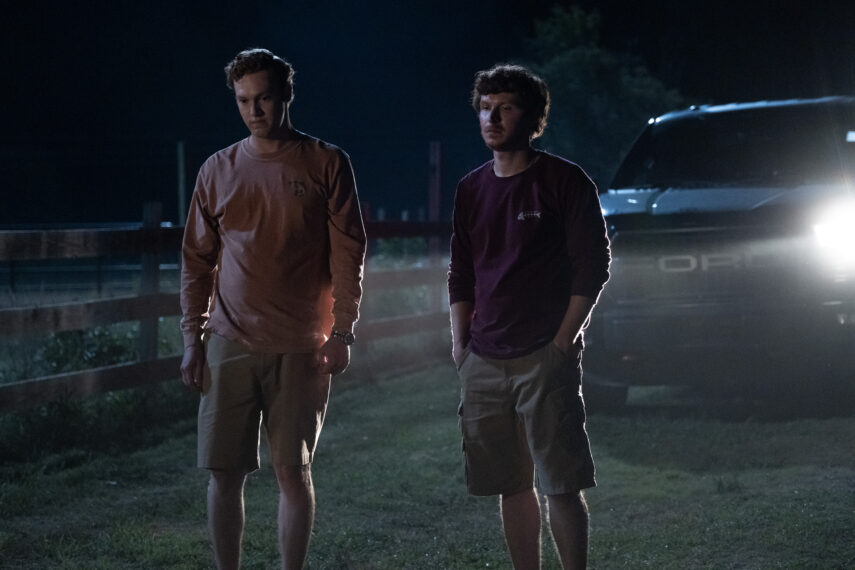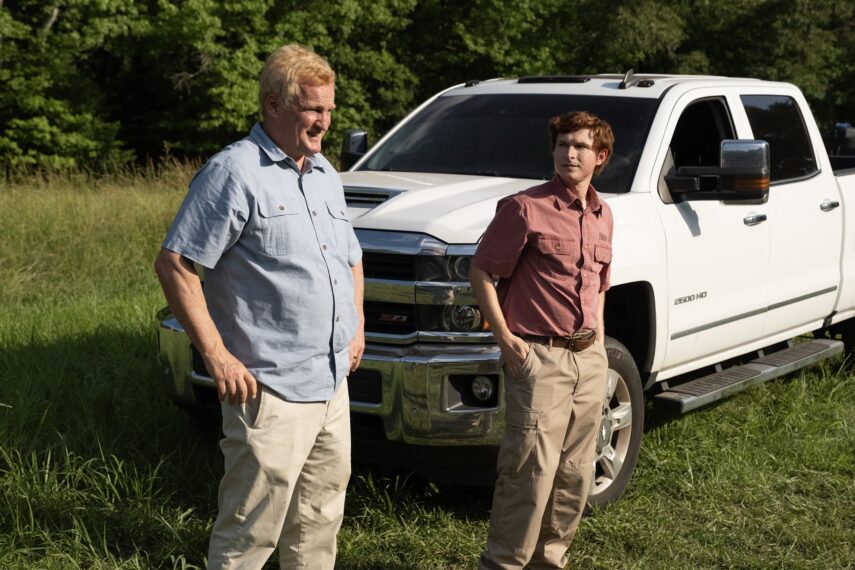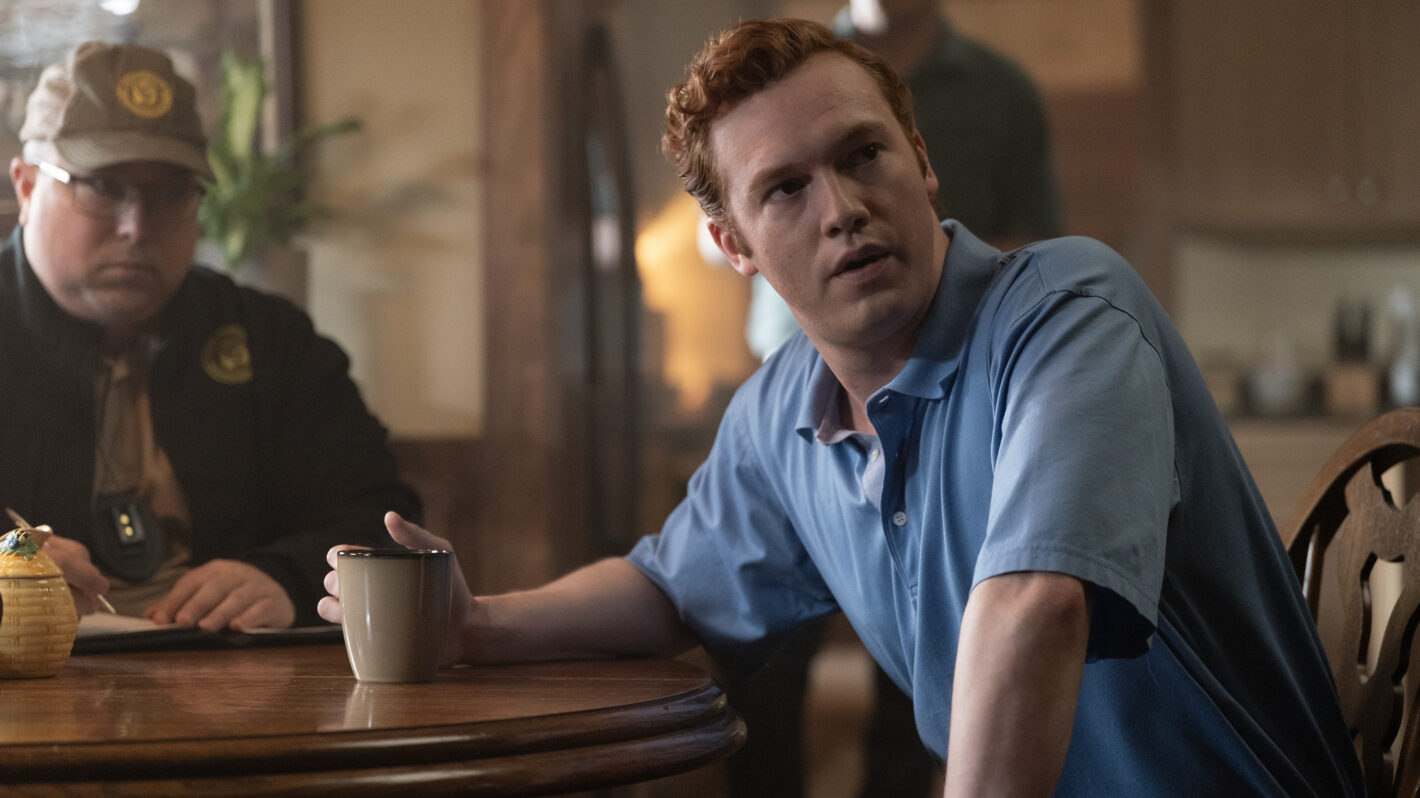[Warning: The following post contains MAJOR spoilers for Murdaugh: Death in the Family Episodes 1-8.]
Before his life was ripped away from him in the gruesome double murder case that would rock the nation, the real-life Paul Murdaugh had already become notorious with the newsreading folks of South Carolina.
Thanks to his alleged responsibility for the drunken boating accident that killed Mallory Beach, his name made countless headlines across the country, and his family was at the center of a lot of scrutiny and public demands for justice. As justified as the negative attention might’ve been, the result was that most had a one-dimensional understanding of him before the murders.
However, Murdaugh: Death in the Family — and particularly Johnny Berchtold‘s searing portrayal of the character — sheds new light on the story, amplifying the hidden tragedy of this person with an almost-redemption arc that’s cut off way too soon by a family annihilator.
In the finale, “Man in the Mirror,” Paul unwittingly gets his revenge when a simple Snapchat video, taken in a moment of innocence and no suspicion of the fate that would befall him, becomes the key to the conviction of his father of his and his mother’s murder. That final revelation is the culmination of a truly dynamic character presentation of someone who was perhaps flattened in the last months of his life by the stories about him.
Throughout the season, TV Insider has talked to the cast and creators about each and every episode, but to dissect the finale and some of the finer details we haven’t yet discussed, TV Insider caught up with Johnny Berchtold for a deep dive into his performance in Murdaugh: Death in the Family.
The executive producers said their goal in making the show was to really bring humanity to all of these people that we see on this kind of two-dimensional platform of the news and other TV versions. With Paul, you had this tranche of public-facing information that was negative, mostly. So where did you go to find the positive, that human side?
Johnny Berchtold: Yeah, I think the first step for me was just blocking out opinions — public opinion [and] my own opinion because I also consumed the story prior to this project, and, yeah, such a polarizing figure, right? So working with this team, they provided so much research and so much information, things that I found out and questioned myself. There would be small details that filled in those gaps between, “Well, I’m supposed to feel this way about this person, but this tells me otherwise.”
With Mandy Matney‘s reporting and Erin [Lee Carr] and Michael [Fuller]’s research, they had these connections and these incredible conversations with people who knew him that just filled in so much of who he was that was completely left out in headlines or coverage. So it was about holding on to those positive aspects that I found, while not forgetting those negative ones, because that, to me, is human. Nobody is ever one thing. I think when you approach any type of character on a project, you try to layer them and see how complex they can be. But with Paul, I knew there was so much more. You’ve just got to look at the way he was raised. And so it was about balancing those things that I would find out.
When you were actually portraying the character, and as you dug into these eccentricities, did you learn something about him along the way?
I did. I did. I consumed so much about who he was and then had to take that and sort of bring my own thoughts and opinions in forming our version of Paul. Something that really struck me that I learned was that he could be very quick to cry. That’s what I heard from someone. I don’t want to take anything as fact. I want to sort of take tools and put them in my toolbox to build this character, and Jason [Clarke] was really incredible and said to me, “We’re not trying to do impressions, we’re just trying to capture the essence.” So when I heard that, I was like, “Well, that’s a really interesting way to tackle this character.”
I think throughout the entire experience, I am playing Paul’s storyline and what he went through and what he did and how he picked up the pieces after that, it just taught me to be kinder to myself… I think we benefit from having a nuanced take on these people, especially when you don’t want to see them as people… I learned a lot. So much.

Disney / Wilford Harewood
Honestly, as a viewer, I learned a lot, too, through your performance. One of the scenes I wanted to talk about is a moment in Episode 5, when Buster and Paul are talking after the Stephen Smith story comes up. They’re standing at the grave, and Paul opens up and says, “I’m dead. I have no future.” And that kind of triggers a similar revelation from Buster. Can you just talk about cracking through the shells of these guys together with Will Harrison?
Well, first of all, Will is the most incredible scene partner. I love that man with all my heart. I’m so grateful that I got to do this with him, and that scene in particular, I’m so happy that you bring it up. It was something that we were really, really excited to dive into. Prior to production, I remember it was like three in the morning, we had just gotten all the scripts. We’re in one of our hotel rooms, and we were just going through, and he goes, “Dude, have you seen this scene in Episode 5?” And we read it together, and it was like this silence between us, and we got chills.
Because within the context of the story, it’s the first time I think that these brothers see eye to eye, and they offer some grace to each other. And by the time we shot that scene, Will and I had gotten so close, and we’d gotten to know each other, and we really made a brotherly bond between us. It was also our last scene that we filmed together, and it’s the last time you see them together. And so there was an emotional weight to it. And then you add that on top of the fact that we were standing in front of Stephen Smith’s memorial, a case that’s still ongoing, and the writers did this really incredible thing where they offered two characters that have been conflicting this whole time, finally coming together and seeing each other.
It really taught me, if something good can come from a tragic death like Stephen Smith, it’s that we need to come together. That’s what it was telling me…. There was so much emotional weight to it across the board, and Erin Lee Carr, one of our cocreators, directed that episode, and Alana Lytle, who wrote it, I think they just crafted a beautiful sequence. I was really honored to be a part of that, and especially to do it with Will.
I also really loved the subtlety of the performance moment in the bar scene in Episode 6, when Paul turns down the shots and then looks over and sees Mallory. It seems like in your face, the way I’m reading it, this was the first time he was comfortable with that ghost being there and kind of accepting that it was just part of him now?
Yeah, right, right. I mean, it’s like, it’s that thing of he’s encountered that flashback of Mallory multiple times throughout the show, and he’s responded differently each time. And I think for the first time, I think he’s coming to the fact that, “This is something I’m going to have to live with forever. I don’t know if there’s a way out. It’s just something that sort of lives with you.” And that’s, I think, what we were trying to do, especially with that storyline, especially by Episode 6, is show that there could have been that possibility of him picking up those pieces and just trying to move forward in the best way possible. And that was taken from him.
I love that moment when he sees Mallory that last time, and, yeah, he does react differently. It’s almost like, “Okay, this is my life. This is what I’ve done. And how can I move forward?” I think he’s also talking about moving in that scene and talking about his future, so there is a way forward. Whatever that is, he’ll have to figure that out.
And declining the alcohol. And then he has that moment with his uncle where he admits that he has a problem, and it’s just so casual, the way he says it.
What’s so interesting about that line, too, when he mentions it, Kat [Candler], who directed the episode, told me specifically about that line, “Just have some self-clarity. Just say it as fact.” And I was like, “Oh. Right. Of course!” It just shows that self-reflection that we just wanted from him the whole time. Of course, we have to take poetic license and sort of try to figure out what may have been going through his mind at that time. But again, it’s these possibilities, this future, this young man [whose life] was taken from him. He didn’t get to do those things. But having that clarity, I think, as an audience member is really important, though. Yeah, I love that moment, too.

Disney / Wilford Harewood
It kind of also dovetails into the next scene that you had with Jason, when Paul is talking about the pills. Something we learned in real life about the case was Alex calling him “little detective” and Paul confronting him about the pills. The way that he does it is very, like you said before, graceful. How did you feel about that scene?
It’s so interesting, too, because all of these characters are on their own journeys, and they come together at really pivotal times. And especially now at this moment in time, with Alex and what we know is coming, Paul has no idea. It’s really such an incredible thing to witness them interact, I think, on that day, because they’re in vastly different headspaces.
I remember shooting that scene was a little — I couldn’t figure it out at first, too, because it’s like, “I don’t want to veer too far from the Paul that we know,” but it’s more of that matter-of-fact, of, “OK, I see what I did.” Paul is a victim of the way he was raised, too, and obviously, that was by Alex. And I think we see some self-reflection with Alex in that moment too, where Paul says, “I don’t think we’re so different,” which is absolutely the case, because Paul was taking his cues from his dad, his entire upbringing. I think for that moment, they get to see what they have become together, which is a really chilling look, especially when we see where that takes us that night.
You talked to us about before about the sense of peace you guys felt on set during the murder scene, but I wanted to talk about maybe more of the clinical aspect of it. It’s one of the few scenes where you really are, especially in Episode 8, following beat by beat what we know from evidence. Can you talk about just the responsibility of that how you approached it?
Yeah, well, part of that massive research packet, that 400 or 500-page binder that they gave us, was detailing those exact minutes to the second of what their phones were doing in that moment. So I got to look at all of those moments. And I mean, I really have to tell you, it was really a heavy experience to consume that information.
Then, taking that and putting it on the screen with the team, especially blocking that sequence out, it’s so interesting that we have that information. When you create a project, when you write a feature film, you write the outline, and then that’s your guideline, and then you write the thing. But like that sort of acted as our outline, and so they really got to mirror that with the way that we filmed it, too… It really informs so much of those final moments.
But yeah, there’s a lot of responsibility when doing that. The experience wasn’t like, “Oh, look at this cool information we have! So cool!” It was always, “OK, this is the responsibility I have. These are the tools. Let’s go put it on the screen.”
Obviously, the Snapchat video portion, especially, is so important to the case. Watching the case unfold here in South Carolina, we saw it as Paul kind of prosecuting from the grave. So can you talk about that particular element?
Yeah, it really is such an incredible moment in that case, where people say he solved his own murder. I must have watched that video a million times, and I had it down beat by beat just in case we wanted to film it exactly how they did. But I think it said so much about why he was filming that video in the first place. He was there to help a friend with a dog, something so wholesome, something so responsible and friendly, and then his life was taken.
Essentially, he solved his own murder because of something good that he was trying to do, is the way I see it…. With a lot of this story, we’re trying to fill in the blanks, but then we have those moments that are factual. And so it’s really trying to bridge that gap and try to get from point A to point B. And that video was so pivotal in that experience.
To me, it kind of echoes the “Man in the Mirror” concept because it’s the last bit we see of him, and he shows Alex himself in that moment, too.
Well, yeah, I think that’s why the case in general is so fascinating, because there are so many reflective parallel moments that you look at this event, and then you bridge the gap to this event, and you go, “Oh, that makes so much sense,” or, “That doesn’t make any sense. How can we make sense of it?” I think something like that, absolutely, and that’s what I think was so great with the writing, is that they would take those, those moments within the story and add that layer of metaphorical messaging, these emotional and thematic arcs that we’re trying to tell. It just nails it down even more so.
For more from Johnny Berchtold, plus other stars and creatives of the Hulu series, check out our prior episodic breakdowns for Episodes 1-3, 4, 5, 6, and 7.
Murdaugh: Death in the Family, Hulu
More Headlines:
- HGTV’s Alison Victoria Mourns Tragic Family Loss: ‘I Love You Eternally’
- ‘The View’ Hosts React to Trump’s ‘Quiet, Piggy’ & Attacks on Female Journalists
- ‘Jeopardy!’: James Holzhauer Blasts Show Over Prize Money — Fans React
- ‘Murdaugh: Death in the Family’: Johnny Berchtold on Bringing Humanity & Hope to His Tragic Character
- Lainey Wilson Joins ‘Family Guy’ Christmas Special & Sings New Theme Song





















(0) comments
Welcome to the discussion.
Log In
Keep it Clean. Please avoid obscene, vulgar, lewd, racist or sexually-oriented language.
PLEASE TURN OFF YOUR CAPS LOCK.
Don't Threaten. Threats of harming another person will not be tolerated.
Be Truthful. Don't knowingly lie about anyone or anything.
Be Nice. No racism, sexism or any sort of -ism that is degrading to another person.
Be Proactive. Use the 'Report' link on each comment to let us know of abusive posts.
Share with Us. We'd love to hear eyewitness accounts, the history behind an article.